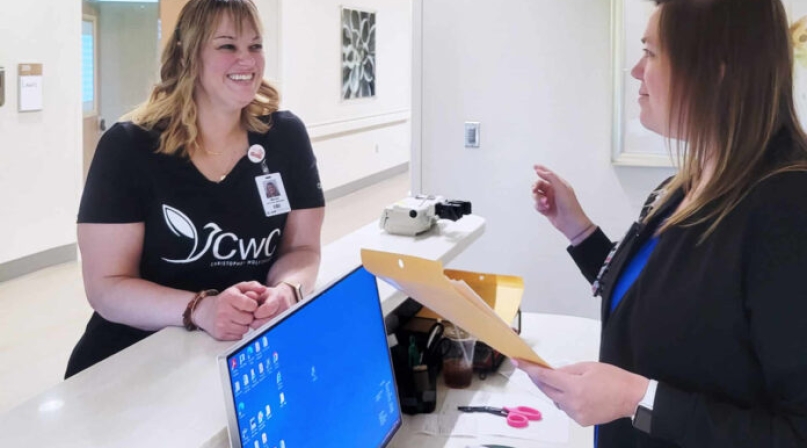Urban opioid education moves to rural counties

Key Takeaways
A hospital program in Fulton County, Ga. that educates patients on opioids, and is working to prevent misuse and dependency at the source, is expanding to four rural counties in Georgia: Coffee, Lowndes, Rabun and Stephens.
The Life Care Specialist model provides every patient who is prescribed opioids with education, support and a pain management plan that addresses tapering off the opioids as quickly as possible to prevent dependency.
When implemented at Grady Memorial Hospital in Atlanta, the Life Care Specialist model demonstrated a 25% reduction in prescription opioid use, with no adverse effect on pain control. Other benefits found in a study on the program included increased patient satisfaction scores and support for the hospital’s patient care team, as well as a reduction in pain-related emergency room visits and readmissions post-discharge from the hospital.
The Georgia Rural Health Innovation Center, Mercer University School of Medicine and the CWC Alliance are working together to expand the Life Care Specialist program to rural counties across Georgia. The death rate involving opioids is 31% higher in rural counties than in urban counties, according to the Centers for Disease Control and Prevention.
The CWC Alliance gets its name from Christopher Wolf, the son of Cammie Wolf Rice (the founder of the alliance), who was diagnosed with ulcerative colitis, a chronic inflammatory bowel disease, when he was in middle school. Wolf was prescribed opioids following surgeries he underwent for the disease, which marked the start of a 14-year battle with opioid misuse and dependency that eventually led to his death.
Wolf is one of the more than 560,000 people in the United States who have died from overdoses involving opioids since 1999. The opioid crisis claims more than 187 lives each day, according to the Centers for Disease Control and Prevention.
Tragedies like the death of her son are avoidable, Rice said, through education on opioid use at the time of prescription and the promotion of pain management alternatives in replacement of overprescription. Life Care Specialists can help turn that corner, she added.
“Had Christopher had the intervention of an LCS, he would be here,” Rice said. “It was such a missing piece in his healthcare journey and the multiple times he was in the hospital. We did not know what we did not know.”
According to a study on opioid use disorders published by the Child and Adolescent Psychiatric Clinics of America, opioids can lead to physical dependence in as little as 4-8 weeks. An estimated 3% to 19% of people who take prescription pain medications develop an addiction to them and roughly 45% of people who use heroin started with an addiction to prescription opioids, according to the American Medical Association.
“Doctors, with pain, don’t know a lot about things other than medication,” said Jean Sumner, dean of the Mercer University School of Medicine, who is also an internist. “They understand the risk, they understand the negatives, but [with Life Care Specialists], now they have a position that actually is like a colleague who has the practical clinical knowledge to achieve pain control for their patients without the need to prescribe, or the need to prescribe as much.”
Life Care Specialist training involves 11 online learning modules (which include opioid education, addiction and treatment, trauma-informed care and pain management approaches), created by the Mercer University School of Medicine, and a clinical practicum at Grady Memorial Hospital, where trainees work alongside Life Care Specialists.
Bailey King, senior Life Care Specialist at Grady Memorial Hospital, oversees the practicum training. On a typical day, a Life Care Specialist sees roughly five to eight patients, she said. If a patient is in the hospital for two weeks, they’ll be seen every day by a Life Care Specialist, and they will continue with follow-ups after discharge if the patient has a history of substance use disorder or mental health issues.
Expansion to rural counties
Mountain Lakes Medical Center in Rabun County has had a Life Care Specialist, Mandy Kuntz, since March, and Stephens County Hospital’s Life Care Specialist is currently going through the training process and will start next month, according to Rice. The South Georgia Medical Center in Lowndes County and the Coffee Regional Medical Center in Coffee County are going through the assessment and onboarding process, respectively, she added.
The volume of patients is higher at Grady Memorial Hospital, but Rabun County’s Mountain Lakes Medical Center has seen more patients with co-occurring disorders, experiencing mental health crises and substance use disorder, than its urban counterpart, according to King.
Life Care Specialists in the rural hospitals will have the opportunity to meet with all patients pre- and post- surgical care, while at the urban trauma center, they meet specifically with orthopedic, sickle cell and pallative care patients after surgery, King said.
“If someone had a car accident or was shot, and they come to Grady, you can’t prepare them for surgery,” King said. “They’re in and out, but in the rural communities, they’ll get to work with them pre- and post-op.”
A college degree is not a requirement for being a Life Care Specialist, but it’s important that an applicant has “empathy and non-judgmental compassion, because the rest can be taught,” and a background in behavioral health, according to Rice. All Life Care Specialists also must be from, or have a connection to, the rural county they’re serving, she added.
From 2020-2023, the use of opioids nearly doubled in Stephens County, according to a Mountain Judicial Circuit report. Life Care Specialists having a connection to the communities they’re serving makes “all the difference in the world,” said Stephens County Administrator and Planning Director Christian Hamilton.
“Knowing they have a vested interest in seeing growth and development in your community — it means everything,” Hamilton said. “We want to keep everything as local as possible, whether it’s having a Life Care Specialist or contractors — anything we can do to keep folks in our community and just increase the quality of life here is vital to us, so I think that’s a phenomenal thing.”
The county government doesn’t directly fund the Stephens County Hospital’s services, but it provides roughly $700,000 in funding each year to the hospital for indigent care, a portion of which goes toward treating people with substance use disorder and those experiencing opioid overdoses, according to Hamilton. The Stephens County Hospital also runs the county’s emergency services response.
Stephens County has spent roughly $70,000 of its opioid settlement dollars it received so far, according to Hamilton. Because of the funding, county buildings, schools, grocery stores and local businesses now have Narcan kits, he said.
Stephens County Commissioner Tara Simmons said that the county is working to create initiatives with local recovery organizations, but because of its rural nature, the county doesn’t have the resources or staff to use the dollars to create a treatment facility (intensive outpatient treatment is currently only available to people in the county who have an open court case related to drugs), so the county is working to fund existing programs right now, she said.
Sumner said she envisions the Life Care Specialist model to become a standard in hospitals across the country as more funding becomes available to tackle the opioid crisis.
“This is an opportunity for every rural community in this state, in this nation, to have somebody who’s a go-to person for pain management, that’s not a prescriber,” Sumner said.
“A person who cares and can direct you to the right resources, so I think it’s exciting to watch it be born.”
Related News
Stretching small opioid settlement allocations helps funding do more
States and localities are set to receive $56 billion in opioid settlement dollars over an 18-year period, but not every county that receives settlement funding will get enough to build out infrastructure.
County News
Peers recognize Rock County, Wis. opioid settlement plan



